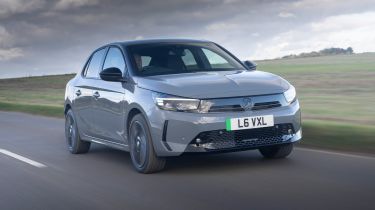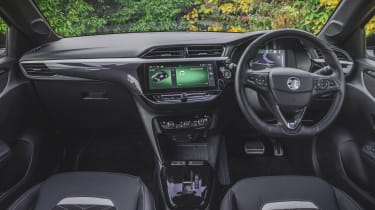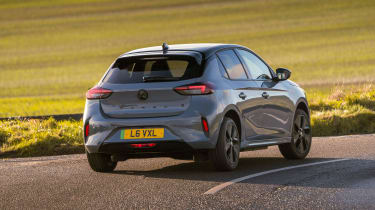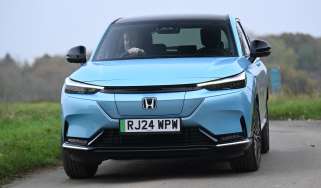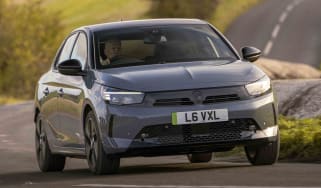Vauxhall Corsa Electric Ultimate 2024 review: more appealing but still expensive
Vauxhall has tried to make the updated Corsa Electric more appealing both visually and financially, but plenty of rivals still undercut it

Verdict
This updated powertrain brings small improvements to the performance, range and efficiency of the Vauxhall Corsa Electric, while the quicker infotainment system and sharper styling make it more appealing than ever. However, despite Vauxhall’s best attempts to boost the EV’s financial appeal, it’s still expensive – not only against a new influx of Chinese rivals that weren’t available when the first Corsa Electric came out, but many established European alternatives, too. Vauxhall really needs to find a way to slash £4-5,000 from the price.
This is the newly revised Vauxhall Corsa Electric. Like the rest of the model range, it has been treated to a cosmetic facelift which brings the brand’s distinctive new ‘Visor’ face, plus technology improvements courtesy of a sharper, faster infotainment system. However, the tweaks are more than just skin deep, because there’s an upgraded powertrain to examine, too.
It’s encouraging to see Vauxhall still pushing for improvement in this segment. From a consumer’s perspective, superminis are perfectly suited to electrification; cars built primarily for urban journeys, with compact dimensions but zero local emissions – a logical answer to the problem of both urban congestion and air quality. Small cars have less weight to lug around, too, so it makes sense to eke out every last watt of energy in the most efficient way.
Used - available now

2019 Vauxhall
Corsa
36,830 milesManualPetrol1.4L
Cash £8,587
2022 Vauxhall
Corsa
17,460 milesAutomaticPetrol1.2L
Cash £14,300
2019 Vauxhall
Corsa
20,283 milesManualPetrol1.4L
Cash £8,663
2019 Vauxhall
Corsa
32,841 milesManualPetrol1.4L
Cash £7,987The new powertrain itself is one that’s not completely alien to us, having already featured in the Jeep Avenger, but will also make its way into the majority of the Stellantis group’s small electric cars, including the Corsa’s posher cousin, the Peugeot e-208, its big brother, the Mokka, and Fiat’s all-new compact SUV, the 600e.
Up front, power comes from a 154bhp electric motor, with energy supplied by a 51kWh (usable) battery. Those numbers are up 20bhp and 1kWh over the existing powertrain, which combined with changes to the energy management systems, have boosted the official range to 246 miles. The existing 134bhp powertrain will continue to be sold alongside the new setup – albeit only in some of the lower-end trims.
Those changes don’t appear particularly dramatic on paper, but they all offer incremental improvements to the way that the Corsa feels on the road. To access that full power, you need to engage Sport mode, which we preferred; like the previous Corsa Electric, lower settings limit output in an attempt to increase real-world range, but they also dull the throttle response which leaves the Corsa feeling a little lethargic.
In Sport, the Corsa zips forward with enthusiasm and can chalk off the 0-62mph sprint in 8.2 seconds. Not only does that make it comfortably the quickest Corsa you can buy right now, but it means that there’s plenty of performance on hand for the occasions where you need to venture out onto A-roads and motorways.
There’s another added benefit at speed, and that’s efficiency. While the old model was frugal around town, its range took a dramatic hit as you closed in on 70mph. That appears to have been all but banished with the new powertrain; regardless of the road conditions, we found the Corsa quite capable of getting close to its official range.
In mild conditions, we were able to exceed four miles per kilowatt hour (4mi/kWh) with very little effort, which means that the Corsa will be one of the more efficient EVs around in everyday driving. Thanks to 100kW charging, a 20-80 per cent top up takes a reasonable 26 minutes, too.
Ride and handling are largely the same as they were before. In other words, the Corsa Electric isn’t quite as agile as its petrol-powered counterparts and the light steering still doesn’t offer much in the way of precision or feedback. On the other hand, its ride is a little less bouncy at speed. Despite a little motor whine under hard acceleration, comfort and refinement in general are impressive for a car this size.
The way that the Corsa drove was rarely a source of criticism, though – the main problem during its first few years of existence has been crippling depreciation. Early 2020 examples of the Corsa electric are now reaching second hand dealers for under £10,000 – a significant drop compared to the £30k-plus starting point.
While that makes it more of a used car bargain with each passing day, Vauxhall has tried to address the problem for new car buyers with a range of measures designed to mitigate those potential losses.
The first is with the trim structure. Previously, the EV models were only available in two trim levels; the lowest option was reserved for ICE models only. This has changed now, with the new Design trim kicking off the three-strong lineup from £32,445. However, the Design can only be chosen with the existing 134bhp electric powertrain, so you can't access the bumps in power, range and efficiency of the new setup. Still, it makes for a £1,285 saving over the GS model one step up, or £2,680 with the new 154bhp motor. The top spec Ultimate model we drove comes in at £38,235.
Beyond that, the other financial benefits come through the finance packages. Electric Corsas benefit from a 5.9 per cent APR representative rate of interest, which undercuts the 8.6 per cent rate reserved for the petrol models. EVs are also available with a new longer five-year PCP term which aims to lessen the effects of that depreciation curve on the monthly figures.
These moves have undoubtedly made the Corsa more competitive. Make the most of that five-year agreement, and mid-spec GS model with the new powertrain dips under £300 a month – though many drivers would need a part exchange to reach those figures, as that comes with a hefty up front payment of £8,781.
Go for a more common four-year deal with a £5,000 deposit, and the same Corsa weighs in at a fairly significant £408 per month. While Vauxhall admits that even the boosted finance figures will struggle to compete with models like the MG4, what should be more of a concern for Vauxhall is that a Volkswagen ID.3 – a larger, more spacious hatchback with stronger performance and a longer range – costs just £3 per month more on matching terms.
A Renault Megane E-Tech, which is more fun to drive and posher inside than either (if more cramped than the VW) is even less, starting from £379 a month.
| Model: | Vauxhall Corsa Electric Ultimate |
| Price from: | £32,445 |
| Price as tested: | £38,235 |
| Powertrain: | 51kWh battery/1x e-motor |
| Power/torque: | 154bhp/270Nm |
| Transmission: | Single-speed automatic, front-wheel drive |
| 0-62mph: | 8.2 seconds |
| Top speed: | 93mph |
| Range: | 246 miles |
| Charging: | 100kW (20-80% in 26 mins) |
| On sale: | Now |
| L/W/H: | 4,060/1,765/1,433mm |

